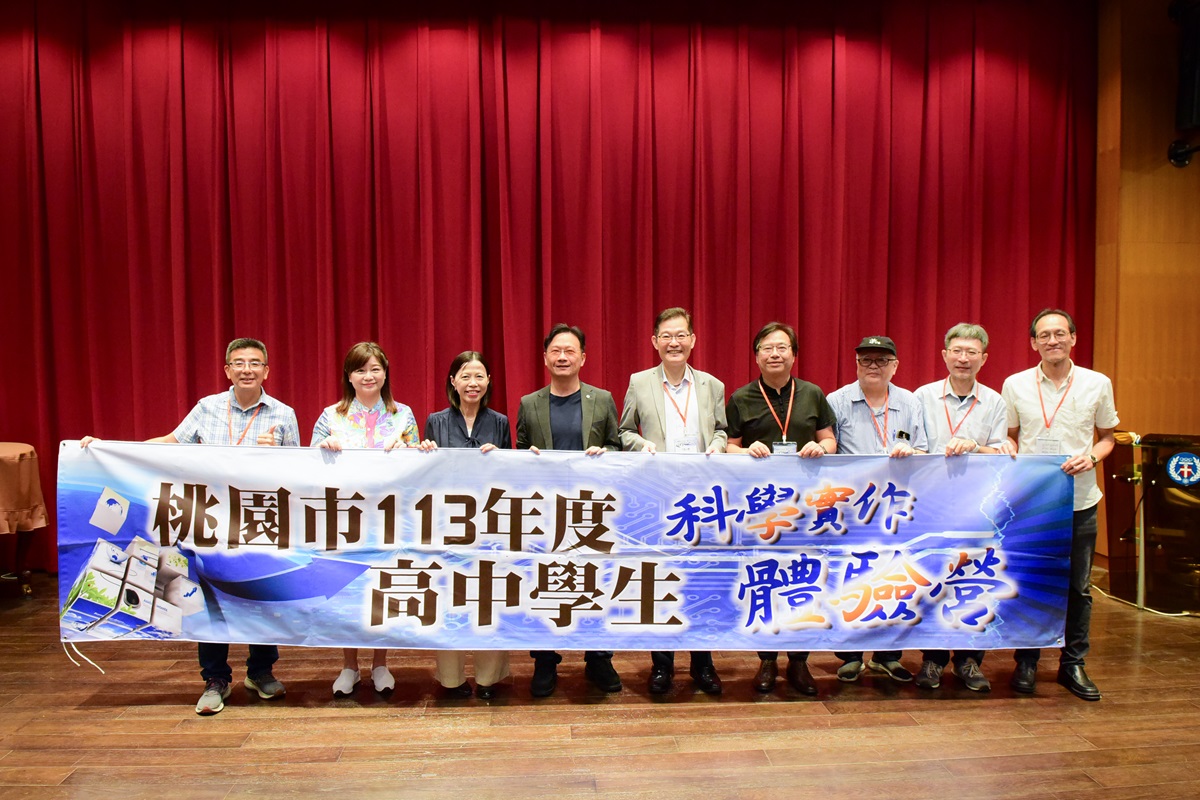The Taoyuan City Education Bureau, in collaboration with Chung Yuan Christian University’s Office of Research and Development and four university-level research centers—the Semiconductor Materials and Advanced Optics Research Center, the Quantum Information Center, the Thin Film Technology Development Center, and the Smart Manufacturing Research and Development Center—held the “2024 Taoyuan City High School Students’ Scientific Practice Experience Camp” on August 21-22. The camp featured thematic science courses, guided tours of advanced instrumentation, and hands-on experiences to enhance students’ understanding of scientific development trends, ignite their scientific potential, and cultivate outstanding scientific talent.
At the opening ceremony, distinguished guests, including Tang Hui-Ling, Section Chief of the Taoyuan City Education Bureau, Liang Chih-Chieh, Curriculum Supervisor, Lin Yu-Feng, Principal of Yang Ming High School, and Hung Ying-Yi, Vice President of Chung Yuan Christian University, attended alongside numerous educators to witness this educational event. The camp attracted students from 12 schools, including Wuling High School, Zhongli Senior High School, Taoyuan High School, Neili High School, and Yang Ming High School. In her speech, Tang Hui-Ling emphasized that in the face of the AI wave, the key to success lies in mastering technological advancements and becoming the winning talent that harnesses this power.

Chung Yuan Christian University is committed to advancing four core technologies—quantum mechanics, electronics, materials science, and automation—in the fields of quantum, semiconductors, thin films, and smart manufacturing, covering all relevant areas of science and engineering. Led by Quantum Information Center Director Chang Yuan-Hsiang and Professor Huang Tsung-Wei from the Department of Computer Science and Information Engineering, students explored the quantum world, learning about the double-slit experiment, the origins of quantum computing, and advanced concepts like quantum superposition and entanglement. This allowed them to see how quantum technology will transform future life. Students also had hands-on experience using the IBM Quantum Platform for Python programming, experiencing the allure of quantum computing. Additionally, they toured the quantum computer lab and the impressive set of the series “Q18,” laying a solid foundation for entering this high-potential field.

Professor Ding Yu-Hong from the Smart Manufacturing Research and Development Center presented a course titled “Magical ‘Shaping’ Techniques: Hands-on Superpowers of Smart Manufacturing.” This course integrated smart manufacturing technologies with the theory and practice of plastic injection molding, enabling high school students to learn about the production processes of the plastic injection industry and smart manufacturing techniques. Students had the opportunity to operate injection molding and laser engraving machines to design and create personalized phone stands and keychains, fostering professional skills in modern manufacturing technologies and encouraging innovative thinking.

Additionally, Professor Li Kui-Ran from the Thin Film Technology Development Center and Professor Tsai Hui-An from the College of Engineering discussed the crucial role of thin film technology in addressing global challenges such as water scarcity, energy shortages, greenhouse effects, and healthcare issues. Through learning about various thin film separation techniques, students gained insights into the importance of thin film technology in high-tech industries and its central role in achieving the 2050 net-zero emissions target.

Professor Wu Chi-Pin from the Department of Physics guided students in exploring the optoelectronic properties of wide-bandgap semiconductors. Through the measurement of photoelectric current in light-emitting diodes, students were introduced to the concept of the “bandgap.” They also operated defect detection equipment, which enhanced their interest and understanding of semiconductor properties and applications.

Vice President Hung Ying-Yi highlighted that Chung Yuan Christian University boasts 41 university-level research centers, demonstrating strong research and innovation capabilities with a focus on its areas of expertise. The Thin Film Technology Development Center ranks among the top in Asia and has signed collaboration agreements with institutions in France and Japan. Meanwhile, the Smart Manufacturing Research and Development Center is the largest teaching demonstration site in Taiwan. Additionally, Chung Yuan Christian University is the first in the country to establish a College of Smart Computing and Quantum Information. This year marks the third year that the university has joined the national quantum team, a remarkable achievement.







自臺大教授謝銘倫(左)手中接任理事長。.jpg)




